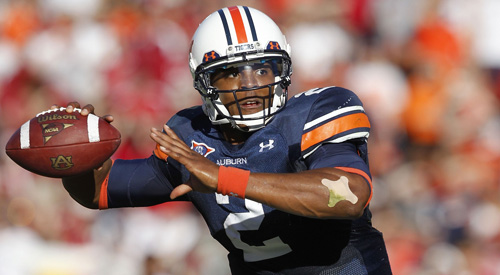
Creating the case for Cam and the call
Let us pretend like we are 10, or 15 years into the future because it’s never too early to start planning for the day that Cam Newton’s professional football career is winding down.
Only 866 of the 4.72 million individuals who have played college football have been inducted into the College Football Hall of Fame. It is such an exclusive group that a notable exception to the 2012 class was quarterback Tommie Frazier, twice a national champion with the University of Nebraska.
It’s safe to say that 15 years from now, Cam Newton’s NFL career will probably be over. (Of course, nothing guarantees that he’ll even play past his rookie contract, but I’m convinced that he is one rare and lasting talent.) At that point, he would be the latest player to hope for an invite to the Hall of Fame.
But, is his service time enough to warrant his invitation?
Ty Hildenbrandt, co-host of the Solid Verbalpodcast, thinks that Newton’s case should be a no-brainer. He writes in an email that it was Newton’s “level of dominance” that’s noteworthy.
[php snippet=1]
In order to be eligible for induction in the Hall of Fame, a player must have been named to at least one first team All-American. Newton’s turn came after the 2010 season, which remains one of the most impressive in recent memory and by far the best of his NCAA career. If the player fulfills this first requirement, then he’s eligible for induction but no sooner than 10 years after he last played in the NCAA–or, if the player played professionally, then he must have retired.
Before he had the greatest rookie season of any quarterback in NFL history, and before he was selected by the Carolina Panthers with the first-overall pick in the 2011 NFL Draft, Newton won the 2010 national championship with the Auburn Tigers. And before that, he won a national championship with Blinn College and, still before that, he was a backup to Tim Tebow with the Florida Gators.
Newton’s candidacy will come down to his one championship season at Auburn and, depending on your point of view, this will help or hurt him. Will one all-time season be enough?
“It shouldn’t trump two or three solid-to-great seasons, but it shouldn’t be overlooked either,” Hildenbrandt says. “If you’re going to be fair, and the Hall of Fame is about rewarding greatness, then shouldn’t greatness be rewarded even if it’s just one season?”
Some will counter that naming Newton to an All-American team is rewarding in and of itself, but that there’s no reason to give Newton the world. Perhaps, but while plenty of players get named to an All-American team, not many have ever equaled Newton’s transcendent 2010 season.
“Cam Newton’s season,” Hildenbrandt says, “was one of the all-time Heisman no-brainers.”
Indeed, he won in a landslide – 2,263 points to second-place Andrew Luck’s 1,079. In 2010, Newton completed 66 percent of his 280 pass attempts for 2,854 yards, 30 touchdowns and only seven interceptions while also running for 1,473 yards and another 20 touchdowns. For good measure, he also caught one touchdown pass.
More than the numbers, it was the way that Newton dominated the Southeastern Conference. He influenced every single play on offense and the Tigers needed him to make every single play that he made in order to compete and finish the season undefeated as they did. Auburn knew this, the opposition knew this and still, he couldn’t be stopped. At six-foot-six and about 250 lbs., Newton often looked like a man among boys – just ask Arkansas. Ask the Crimson Tide too, who had a 24-0 lead in the first half in Tuscaloosa but lost 28-27. And ask South Carolina, who lost the SEC Championship game 56-17. All Cam Newton, all the time.
Yet, it’s when you fill in the blanks between Florida and Auburn that Newton’s candidacy becomes interesting. His time in the NCAA was heavy with both good and bad storylines. He was a backup to the anointed one for two forgettable seasons at Florida and might or might not have been found in possession of a stolen laptop in November of 2008, which ultimately led to him transfer to Blinn College. There, he redeemed himself in leading the school from Brenham, Texas to the Junior College National Football Championship. Depending on what you believe next, he then may or may not have been involved in a pay-for-play scheme with schools like Auburn, Mississippi State and Oklahoma when he was debating where to transfer following the 2009 season. Still, through a 13-month investigation he played, and played well.
Newton can’t lose despite the storylines, because anybody who wants to insist on the controversies that followed him everywhere must acknowledge that he didn’t let it affect his level of play on the football field. “The people citing Newton’s off-field issues as a reason not to put him in are the kinds of people who wouldn’t vote him in even if he were a choir boy,” Hildenbrandt says. “Certainly, he wouldn’t be the only Hall of Famer shrouded with controversy.”
There’s something else, too. In debating the faults and merits of one candidacy, the Hall will also look at a player’s post-football record as a citizen. Its website says that a player “must have proven himself worthy as a citizen.” Perhaps this includes life in the NFL?
“He’s off to a fantastic start,” Hildenbrandt says. “I do think (success in the NFL) can help him even if it’s not supposed to.”
In other words, go on, Cam. Throw, run and, most importantly, win big with the Carolina Panthers. We will all still be here in 10 or 15 years. And by then, each of us will have refined our arguments, and our rebuttals, regarding your candidacy. (But your spot is safe. Maybe.)
[php snippet=1] http://credit-n.ru/zaymyi-next.html http://credit-n.ru/zaymyi-next.html www.zp-pdl.com

